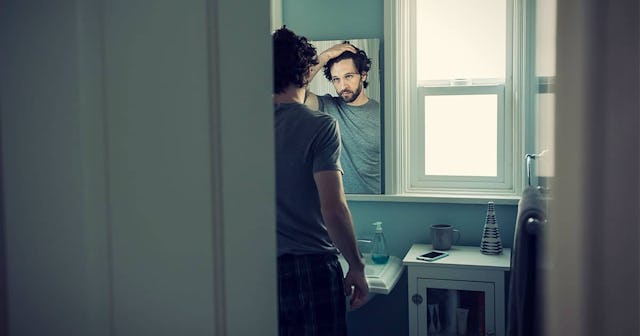My Therapist Suggested Having A Conversation With My Younger Self — And It Was Transformative

My therapist is a skinny, awkward, black haired man, with bloodshot eyes that are never completely open and an affinity for pastel polo shirts that he unbuttons just enough to let his clients, myself, God, everyone know that he has a spackle of very dark, curly chest hair.
We’ve been meeting a lot recently because of the pandemic. I’ve more or less been a nervous wreck of a man, waiting for the next bad thing to happen. I have to assume a lot of people are feeling this way, but right now, for those of us with chronic anxiety, it’s twice as bad.
A lot of my fear of the next bad thing comes from having a pretty rough childhood. My father was addicted to pain medication and alcohol. I am convinced he had undiagnosed bipolar disorder, and during his manic episodes, he engaged in some pretty destructive behavior, often finding himself locked up for months at a time. And my mother was a hot-headed woman, with pretty bad anxiety and depression. All of this caused me to run away from home at 14, and eventually be raised by my grandmother.
I often meet with my therapist via Zoom in our upstairs closet, because it’s the only place in my house where I can talk freely without my family hearing. My therapist and I have spent a lot of time this summer “addressing my childhood trauma,” something I’d intentionally avoided with my other therapists. With my first therapist, I told him I couldn’t remember much from my childhood. I’m not going to say that he never asked about it; he did. But he didn’t push it. My second therapist never even brought it up.
But this guy, he went right to the heart of it.
One afternoon he asked me to imagine a younger version of myself was standing before me, awkward and nervous, with bucked teeth and greasy bleached blond Kurt Cobain hair parted down the middle, in baggy ’90s clothing. Okay, he didn’t tell me to add all those details, but I know how I looked in the ’90s.
Anyway, he asked me what I would tell my younger self if I had the chance — and I must say, as odd as it sounded, this moment was pretty transformative.
All I could think about was when I was 15, and I’d been living with my grandmother for a year or so. My father was a drug addicted mess. My mother was an emotional wreck, who yelled more than she nurtured. I was terrified of both of them.
I cannot overstate how much living with my grandmother saved me as a child. Her home was a peaceful place where no one yelled. She was as consistent as the tide, waking at the same time each morning and going to bed at the same time every night. I knew what she expected of me, and that she loved me, and she had enough emotional consistency to be there for me in the ways I needed as a teenager. She expected me to do well in school and attend church, and she did it all with warmth and clarity. She never came home drunk or drove across the lines in the road, like my father. She never went to jail. And she didn’t go on rage filled tirades like my mother.
I can remember as a child being so afraid that my grandmother — who was in her 70s but appeared to me to be 800 years old — would die, and I’d be forced to move back in with either my mother or father. I would sit up in bed at night, a pit in my gut, terrified. Sometimes when the fear got to be too much, I would sneak into Grandma’s room and place my finger under her nose to make sure she was still breathing.
In my closet, with the therapist on my computer screen, I closed my eyes and thought of that awkward, scared young man I used to be. My therapist told me to think about what I know now and how my life has turned out. Then he told me to think about what I would tell my younger self if I had the chance.
I could see myself in my mind’s eye, and I looked at that young man and told him that he didn’t need to be scared anymore. “You are going to overcome all of this,” I said. “Grandma is going to see you through high school. You will get married to a wonderful person. You will go to college, and have children, and get a good job, and own a house, and all this madness, this inconsistency, this fear you feel every day, will be put behind you. You’re going to be okay.”
Then my younger self looked up at me and smiled, and I felt the warmth of knowing that I didn’t have to be afraid anymore. It was a wonderful, freeing feeling that I hadn’t even known I needed.
It’s funny, when you grow up waiting for the next bad thing to happen, it can become this repetitive hell. Even when things are going well, you can’t help but sit and wait, a tightness in your gut, expecting the next bad thing. But this conversation with myself seemed to put some of that to bed. So if you had a rough patch as a child, and that anxiety has leaked into your adult life, try talking to your younger self.
It might just be a game changer for your mental health.
This article was originally published on